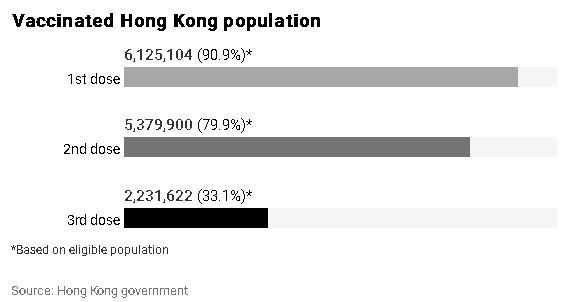Hong Kong News

Hong Kong reports record 198 Covid deaths; 27,000 new cases logged
Hong Kong reported a record 198 coronavirus-related deaths on Saturday, although the recent downtrend in cases remained in place, with officials confirming about 27,600 new infections.
City leader Carrie Lam Cheng Yuet-ngor cautioned against premature optimism that infection numbers had peaked, adding that she “could not comfortably say” that was the case. Nor was she willing to commit to a time frame on when the government expected to get the raging fifth wave of infections under control. She called such a promise “not very scientific”.
“We will closely monitor the coming days to see if we are experiencing a drop in confirmed cases, especially under the self-declaration system which counts those who tested positive through the rapid antigen kit,” she told a press briefing.
“Although some experts have said that perhaps we have passed the peak, we’d rather take a very cautious stance.”
Officials confirmed 27,647 new Covid-19 cases, including 11,858 positive results reported on a new government online portal by infected residents using rapid antigen test (RAT) kits.
As well as the 198 Covid-related deaths recorded in the past 24 hours by public hospitals, 87 earlier fatalities were also logged, bringing the overall toll to 3,729.
“The number of infections has plateaued but we do not see a downward trend in terms of the proportion of positive cases identified in lockdowns, so the general public should remain vigilant and comply with social-distancing measures,” said Dr Albert Au Ka-wing of the Centre for Health Protection (CHP).

According to official data, 13.4 per cent of residents in government-mandated lockdowns had tested positive from February 25 to Wednesday, with the figure at 12.5 per cent over the past two days.
Saturday also saw a meeting of the joint scientific committees under the Department of Health where experts discussed the possibility of allowing those aged below 60 to get their booster shot of Covid-19 vaccine three months after their second dose rather than six months.
On March 4, authorities shortened that interval for those aged 60 or above who have received two doses of the Sinovac or BioNTech vaccine.
Professor Lau Yu-lung, who chaired the Scientific Committee on Vaccine Preventable Diseases, had called for the change earlier in the day on a radio show.
In response to findings that at least 10 per cent of Hongkongers with family members in care homes remained reluctant to vaccinate their loved ones, Lau argued they should shoulder the responsibility.
“They need to give their rejection in writing,” he said, suggesting also that authorities should consider allowing care homes to refuse services for unvaccinated residents.
Au of the CHP said another 23 residential care homes had reported outbreaks, infecting 267 elderly or disabled residents and 115 staff members. The fifth wave has ripped through many residential care homes, with 742 facilities logging cases since late December.
The health official also announced that from Monday, those reporting an infection on the government’s online portal would receive a verification link to upload proof of identification and a photo of their positive RAT result.
Proof must be submitted within 24 hours to verify an infection and allow patients to receive isolation orders accurately, Au said.
Asked if there were a lot of patients not reporting their cases and whether that would undermine the authority’s assessment of the Covid-19 situation, Au said he did not believe so, as the figures for RAT and polymerase chain reaction (PCR) test results had similar trends, hovering at about 10,000 and 20,000 cases respectively. He said the government could only rely on the public voluntarily reporting their RAT results.
Those who did not receive the SMS verification code after reporting their positive results on the platform could email ratp@dh.gov.hk or dial the automated system at 1836 119 to iron out any issues, Au added.
“In the past few days, we have received many calls and inquiries, mostly on technical issues,” he said.
However, a dedicated hotline to report positive RAT results for those living or working in areas where traces of the coronavirus have been detected in sewage will stop operating from Sunday. Instead, they should report their results to the government website.
Civil servants, meanwhile, are allowed to report back to work even after testing re-positive by RAT or PCR screening following completion of their isolation period.
Au said that if civil servants tested positive again some time later while working in the field and had already completed 14 days of isolation, the risk of infection was low.
“There are still some [virus] remnants in the body and the transmissibility is pretty low,” he said. “It’s not considered reinfection but a re-positive … and the person will have immunity after being infected previously.”











